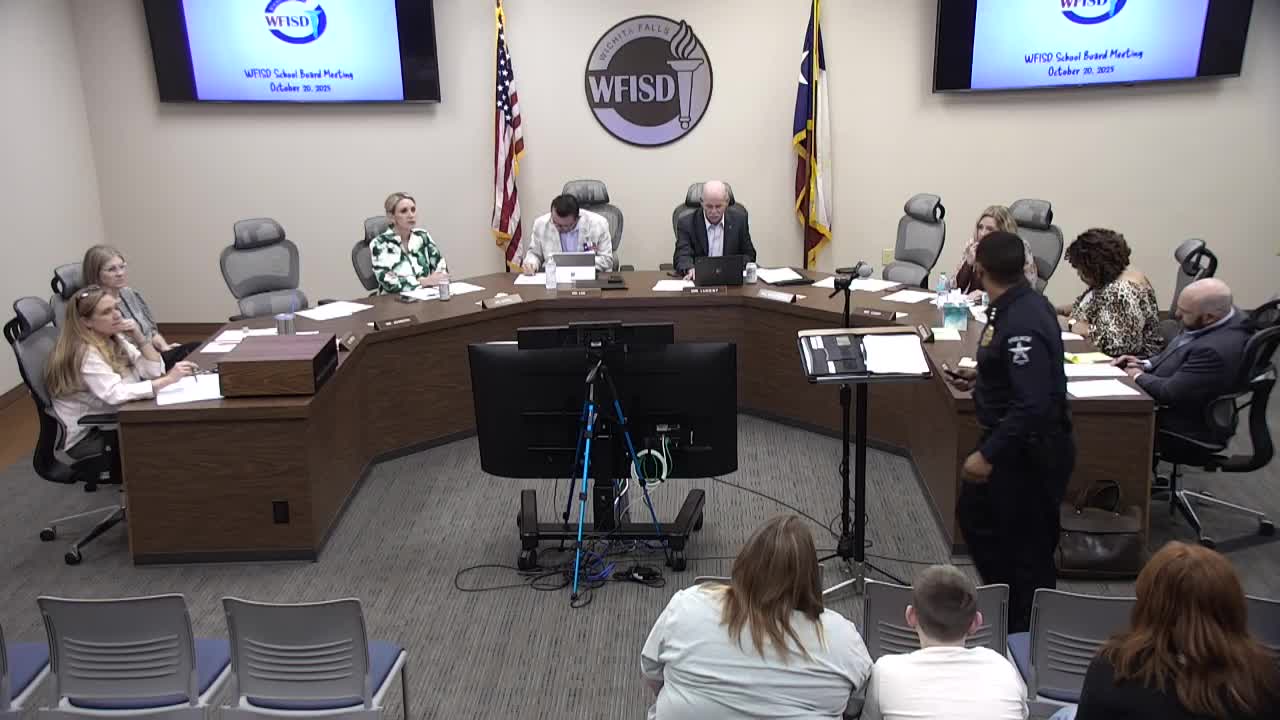Superintendent proposes off‑duty detection-dog sweeps at secondary campuses; board discussion focuses on privacy, disruption and cost
October 20, 2025 | WICHITA FALLS ISD, School Districts, Texas
This article was created by AI summarizing key points discussed. AI makes mistakes, so for full details and context, please refer to the video of the full meeting. Please report any errors so we can fix them. Report an error »

District leadership presented a proposal to contract with a private K‑9 vendor to conduct unannounced, noninvasive sweeps at secondary campuses to detect illegal drugs and weapons.
The district said the vendor, based in the Dallas–Fort Worth area, specializes in school K‑9 operations and has handlers with law-enforcement experience. Staff told the board the intended scope is secondary campuses only (middle and high schools and the CEC) and that sweeps would focus on common areas, lockers and parking lots rather than classroom backpack searches. Superintendent Donnie Lee framed the program as proactive deterrence and reassurance for students and staff rather than an enforcement campaign.
Why it matters: The program affects student privacy, campus disruption and enforcement procedures. Staff said the district already has a board policy (FNF) governing trained dogs and that the private vendor was chosen to provide broader detection capability (dogs that detect narcotics and weapons) than a city or county K‑9 unit might offer.
Cost and logistics: Staff presented an approximate contract cost of $8,000 per year for six to sixteen visits — described in the meeting as $500 per visit — and said the vendor typically can cover multiple campuses in a single day. Visits would be regular but unannounced to preserve deterrent value. Staff said the district would notify parents and the community about the program if the board approves so that the presence of dogs does not cause alarm.
Board and public questions: Trustees asked about student disruption and whether dogs would search backpacks or enter classrooms; staff said the planned method is limited to noninvasive sweeps in public spaces and parking lots and that searches of personal items would not be routine. A trustee also suggested training dogs to detect cell phones; staff said sniffs of cell phones already occur in some jurisdictions. The superintendent stressed that the objective is to find nothing: a clean sweep is treated as a success.
Status: The presentation was informational; no formal board vote was recorded in the transcript.
The district said the vendor, based in the Dallas–Fort Worth area, specializes in school K‑9 operations and has handlers with law-enforcement experience. Staff told the board the intended scope is secondary campuses only (middle and high schools and the CEC) and that sweeps would focus on common areas, lockers and parking lots rather than classroom backpack searches. Superintendent Donnie Lee framed the program as proactive deterrence and reassurance for students and staff rather than an enforcement campaign.
Why it matters: The program affects student privacy, campus disruption and enforcement procedures. Staff said the district already has a board policy (FNF) governing trained dogs and that the private vendor was chosen to provide broader detection capability (dogs that detect narcotics and weapons) than a city or county K‑9 unit might offer.
Cost and logistics: Staff presented an approximate contract cost of $8,000 per year for six to sixteen visits — described in the meeting as $500 per visit — and said the vendor typically can cover multiple campuses in a single day. Visits would be regular but unannounced to preserve deterrent value. Staff said the district would notify parents and the community about the program if the board approves so that the presence of dogs does not cause alarm.
Board and public questions: Trustees asked about student disruption and whether dogs would search backpacks or enter classrooms; staff said the planned method is limited to noninvasive sweeps in public spaces and parking lots and that searches of personal items would not be routine. A trustee also suggested training dogs to detect cell phones; staff said sniffs of cell phones already occur in some jurisdictions. The superintendent stressed that the objective is to find nothing: a clean sweep is treated as a success.
Status: The presentation was informational; no formal board vote was recorded in the transcript.
View full meeting
This article is based on a recent meeting—watch the full video and explore the complete transcript for deeper insights into the discussion.
View full meeting
